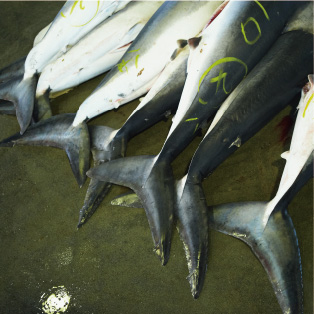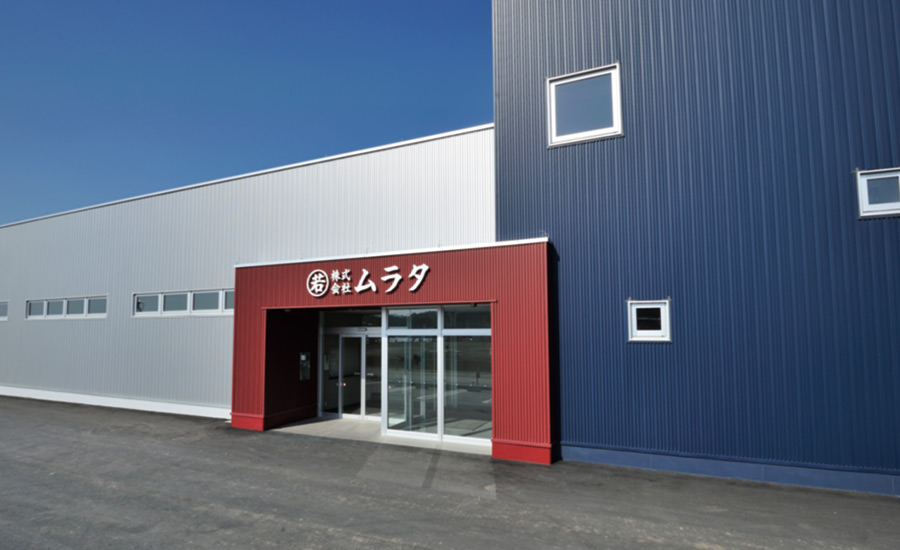
Murata Co.,Ltd.
988-0004 1-6-26 Hamacho, Kesennuma-city, Miyagi
President and CEO: Makoto Murata (Director)
TEL:+81-(0)226-22-5010
FAX:+81-(0)226-22-5011
e-mail:maruwaka@f4.dion.ne.jp
Murata knows everyting about the Kesennuma shark and uses every part of it
Fresh shark meat is processed into paste or minced as ingredients for food products. Tanned sharkskin is used for scarce leather products. The company is proactive in “creating a new value” for the shark.
Taste and materials
With a vast knowledge of the shark, Murata offers its customers excellent food and non-food products processed from sharks from Kesennuma, an area known as a treasure trove of good quality sharks.

Equipment
Presently, the company’s food processing factory is in operation. It plans to establish a new division for tanned sharkskin in the near future.
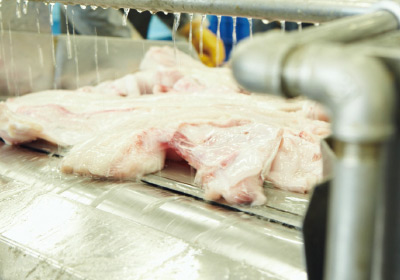
Crafstmanship
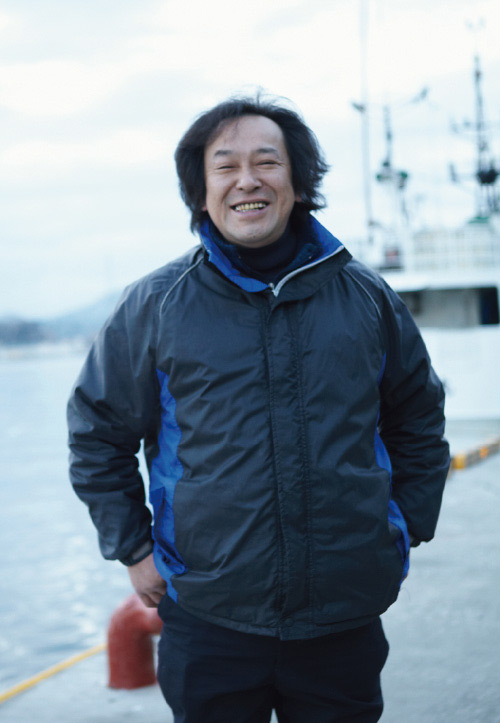
Knowing every aspect of sharks in Kesennuma. Utilizing them to their fullest potential.
Murata Co., Ltd. Representative Director and President, Makoto Murata.
“The skill to ‘cut’ discerns The quality of the shark.”
In the early morning at the Kesennuma fish market, as soon as you step inside, you’ll find various types of fish neatly arranged by category, with seafood vendors carefully inspecting them before the auctions begin.
Amidst this scene, you’ll spot Masaru Murata. Murata is the President and CEO of Murata Co., Ltd., a company that deals with sharks. Every morning, he purchases large quantities of sharks here and personally transports them to the factory by truck. He makes over 10 round trips a day, the number depending on the volume of purchases. Only in the afternoon does he finally have time to carry out his duties as CEO in the company’s office or participate in factory operations.
Inspecting the purchased sharks is also one of Murata’s important tasks. If he notices any stiffness in the fish, they are stored in the storage room attached to the factory. The flesh of the mainly handled smooth-hound sharks is used as minced fish or ground fish paste, the raw material for products like fish cakes.
Murata, born in Kesennuma, was a renowned baseball player since his Little League days in elementary school. He attended the prestigious Tokai University-affiliated Daiichi High School in Shizuoka, where he played in both the spring and summer Koshien tournaments. Following that, he continued his illustrious career by attending the prestigious Meiji University. His resolute actions and attitudes, and his dedicated approach to work, still seem to embody the spirit of baseball.
After graduating from university, he worked for a company in Tsukiji for about two years before returning to Kesennuma and joining Murata Co., Ltd. Upon joining the company, he spent over a decade focused solely on the task of “cutting.” His words, “You only understand the quality of a shark by continuously cutting. It’s through continuous cutting that you come to understand,” reflect the wisdom gained from years of experience.
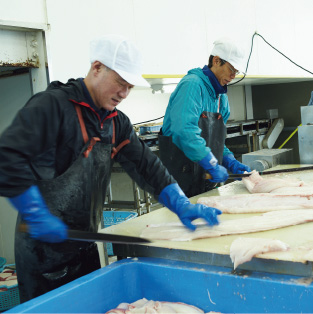

Utilizing every part of the shark effectively. And adding value.
At Murata, every part of the shark is effectively utilized. The meat becomes food, the bones are used as ingredients for health supplements, and even the skin is put to use. Another significant aspect of Murata’s operations is the processing of shark skin.
Handling a large number of sharks daily means having plenty of shark skins readily available. Executive Managing Director Susumu Murata describes it as “a new challenge to effectively utilize the treasure of Kesennuma.”
The shark skin has a smooth, soft surface with unique patterns and is highly durable against water, making it a high-quality material. By tanning and utilizing this shark skin in various products, new possibilities emerge.
Currently, the processed raw material, the “skin,” is frozen and sent to a shark leather company in Nagano for further processing. There are plans to establish this division in Kesennuma in the near future, dedicating even more effort to it.
One heartwarming story involves pen cases made from Murata’s shark skin being presented as commemorative gifts at Kesennuma’s coming-of-age ceremony. The local board of education requested locally made items for the commemorative gifts, and Murata produced them, distributing them to about 600 new adults. Susumu Murata hopes that through these pen cases, young people will feel pride and attachment to their hometown and perhaps return in the future.
After the interview, Susumu Murata came across a letter from a university student from Kesennuma who couldn’t return home often but wanted to feel connected to their hometown by using the pen case every day. It seems that Murata’s sentiments are effectively conveyed through these pen cases.
Despite resuming operations the year after the earthquake, President Shin Murata says that production is still only about half of what it used to be. Murata is now striving as a united team, carrying the pride of being part of Kesennuma, the town of sharks.

